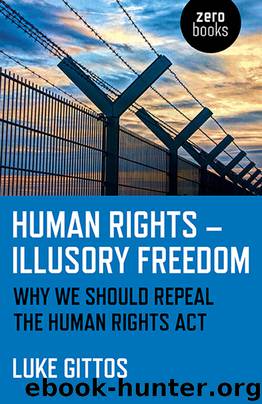Human Rights - Illusory Freedom by Luke Gittos;

Author:Luke Gittos; [Gittos, Luke]
Language: eng
Format: epub
ISBN: 978-1-78535-688-9
Publisher: John Hunt (NBN)
Published: 2019-02-21T16:00:00+00:00
The claims of human rights organisations
In 2016, Liberty launched a campaign called ‘Save our Human Rights Act’. This campaign, involving posters and merchandise, listed a number of cases that ‘would not have been possible without the human rights act’. The point of the campaign was to encourage the idea that human rights represent a small part of our justice system that genuinely cares about vulnerable people. The term ‘our’ Human Rights Act also suggested that this piece of legislation belonged to the public rather than those in power. It was something we owned in order to limit the power of the state44.
The campaign material was hyperbolic about the impact of the Human Rights Act. The campaign proclaimed:
‘Our Human Rights Act has already achieved so much. It’s held the State to account for spying on us, safeguarded our soldiers, and supported peaceful protest. It’s helped rape victims, defended domestic violence sufferers, and guarded against slavery. It’s protected those in care, shielded press freedom, and provided answers for grieving families. Its protections are the most fundamental – those we should all enjoy, because we’re human’.
It was as though Liberty had drawn up a list of people widely considered to be the most vulnerable in society and claimed that the Human Rights Act had helped them on that basis alone.
These claims are very broad. Firstly, the term ‘held the state to account’ is vague. The Human Rights Act has not figured at all in the passage of key pieces of legislation which increased the state’s ability to ‘spy’ on us. As we have seen, the claim that the Act had ‘shielded press freedom’ ignores the fact that the Act has been on the statute book at a time when freedom of the press has been subject to significant limitation by our government. The Levenson Inquiry sought to establish the first statutory regulator of the press for centuries. Human rights laws simply do not appear in the significant debates around press freedom. An argument could be made that a case under the Act had allowed for a defence of a particular kind of press freedom for a particular journalist under particular circumstances. A good example is the case of Financial Times and Others v United Kingdom45 which narrowly prevented the disclosure of journalistic sources in the course of UK litigation on the basis that it would violate Article 10. But this is not ‘shielding press freedom’, but rather deciding that a particular violation of press freedom is unacceptable, while allowing a multitude of others. The leading authorities involving the United Kingdom and Article 10 involve the justification on limits on press freedom, as we will see in a later chapter. The claim that the Act had ‘guarded against slavery’ was not questioned, even though slavery has been illegal throughout the British empire since the early 19th Century.
Along with the hyperbolic written materials, Liberty produced a series of videos in which high profile actors told the stories of those who had experienced victories under the Human Rights Act.
Download
This site does not store any files on its server. We only index and link to content provided by other sites. Please contact the content providers to delete copyright contents if any and email us, we'll remove relevant links or contents immediately.
| Anarchism | Communism & Socialism |
| Conservatism & Liberalism | Democracy |
| Fascism | Libertarianism |
| Nationalism | Radicalism |
| Utopian |
The Secret History by Donna Tartt(19011)
The Social Justice Warrior Handbook by Lisa De Pasquale(12179)
Thirteen Reasons Why by Jay Asher(8878)
This Is How You Lose Her by Junot Diaz(6866)
Weapons of Math Destruction by Cathy O'Neil(6253)
Zero to One by Peter Thiel(5778)
Beartown by Fredrik Backman(5723)
The Myth of the Strong Leader by Archie Brown(5488)
The Fire Next Time by James Baldwin(5420)
How Democracies Die by Steven Levitsky & Daniel Ziblatt(5207)
Promise Me, Dad by Joe Biden(5137)
Stone's Rules by Roger Stone(5072)
A Higher Loyalty: Truth, Lies, and Leadership by James Comey(4942)
100 Deadly Skills by Clint Emerson(4907)
Rise and Kill First by Ronen Bergman(4766)
Secrecy World by Jake Bernstein(4735)
The David Icke Guide to the Global Conspiracy (and how to end it) by David Icke(4693)
The Farm by Tom Rob Smith(4496)
The Doomsday Machine by Daniel Ellsberg(4477)
